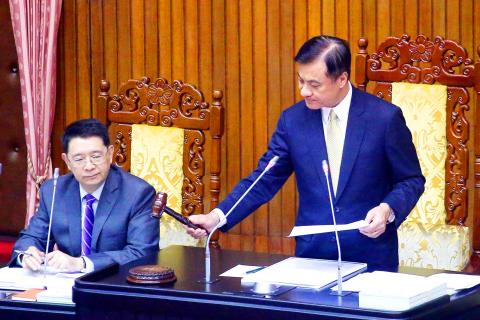Taiwanese who commit aggravated fraud overseas are now to be subject to punishment in Taiwan after the Legislative Yuan passed an amendment to the Criminal Code yesterday.
The amendment to Article 5 of the Criminal Code added “aggravated fraud” to the list of offenses committed “outside the territories of the Republic of China” to which the Criminal Code will apply, making it easier to prosecute suspects in Taiwan.
The revision is to take effect when it is promulgated by the president, a formality that usually takes about two weeks.

Photo: CNA
Under existing law, aggravated fraud is not among the offenses listed under Article 5, making it nearly impossible for authorities to prosecute alleged fraudsters after they return to Taiwan.
In some cases, offenses committed overseas, but not listed in Article 5, may still be covered by the Criminal Code, but only if they are punishable by at least three years in jail.
As people guilty of fraud in Taiwan face jail sentences of between one and seven years and fines of up to NT$1 million (US$31,378), many cases do not meet the three-year threshold.
These legal loopholes have often forced prosecutors to drop cases against citizens suspected of committing fraud overseas.
Chinese Nationalist Party (KMT) Legislator Hsu Shu-hua (許淑華), who proposed the amendment, said a spate of recent cross-border telecom fraud cases involving Taiwanese called attention to the nation’s lenient treatment of its citizens committing fraud overseas and the possibility that it encouraged more criminal activity.
These cross-border fraud cases have tarnished the image of Taiwan’s judicial system and given the impression that “Taiwan is unwilling to harshly crack down on fraud and condones the perpetrators’ actions,” or that “Taiwan is a haven for fraudsters,” she said.
Hsu supported Taiwan’s judicial authorities having jurisdiction over Taiwanese who commit fraud overseas, which she said would live up to the expectations of the public and improve the image of the nation’s judiciary.
Dozens of Taiwanese have been arrested in countries such as Kenya, Malaysia and Indonesia over the past year for suspected involvement in fraud rings that were scamming people in China.
China then pushed, successfully in most cases, to have Taiwanese sent to China for prosecution rather than to Taiwan, arguing that it had jurisdiction over the cases because the victims were in China and Taiwan would not punish the suspects.

CHAOS: Iranians took to the streets playing celebratory music after reports of Khamenei’s death on Saturday, while mourners also gathered in Tehran yesterday Iranian Supreme Leader Ayatollah Ali Khamenei was killed in a major attack on Iran launched by Israel and the US, throwing the future of the Islamic republic into doubt and raising the risk of regional instability. Iranian state television and the state-run IRNA news agency announced the 86-year-old’s death early yesterday. US President Donald Trump said it gave Iranians their “greatest chance” to “take back” their country. The announcements came after a joint US and Israeli aerial bombardment that targeted Iranian military and governmental sites. Trump said the “heavy and pinpoint bombing” would continue through the week or as long

TRUST: The KMT said it respected the US’ timing and considerations, and hoped it would continue to honor its commitments to helping Taiwan bolster its defenses and deterrence US President Donald Trump is delaying a multibillion-dollar arms sale to Taiwan to ensure his visit to Beijing is successful, a New York Times report said. The weapons sales package has stalled in the US Department of State, the report said, citing US officials it did not identify. The White House has told agencies not to push forward ahead of Trump’s meeting with Chinese President Xi Jinping (習近平), it said. The two last month held a phone call to discuss trade and geopolitical flashpoints ahead of the summit. Xi raised the Taiwan issue and urged the US to handle arms sales to

BIG SPENDERS: Foreign investors bought the most Taiwan equities since 2005, signaling confidence that an AI boom would continue to benefit chipmakers Taiwan Semiconductor Manufacturing Co’s (TSMC, 台積電) market capitalization swelled to US$2 trillion for the first time following a 4.25 percent rally in its American depositary receipts (ADR) overnight, putting the world’s biggest contract chipmaker sixth on the list of the world’s biggest companies by market capitalization, just behind Amazon.com Inc. The site CompaniesMarketcap.com ranked TSMC ahead of Saudi Aramco and Meta Platforms Inc. The Taiwanese company’s ADRs on Tuesday surged to US$385.75 on the New York Stock Exchange, as strong demand for artificial intelligence (AI) applications led to chip supply constraints and boost revenue growth to record-breaking levels. Each TSMC ADR represents

State-run CPC Corp, Taiwan (CPC, 台灣中油) yesterday said that it had confirmed on Saturday night with its liquefied natural gas (LNG) and crude oil suppliers that shipments are proceeding as scheduled and that domestic supplies remain unaffected. The CPC yesterday announced the gasoline and diesel prices will rise by NT$0.2 and NT$0.4 per liter, respectively, starting Monday, citing Middle East tensions and blizzards in the eastern United States. CPC also iterated it has been reducing the proportion of crude oil imports from the Middle East and diversifying its supply sources in the past few years in response to geopolitical risks, expanding